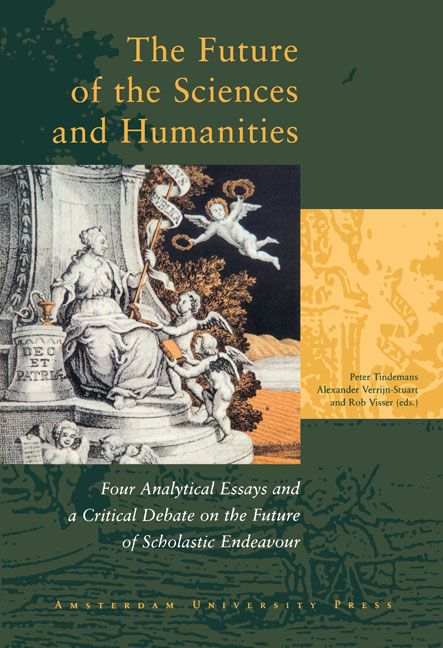 The Future of the Sciences and Humanities
The Future of the Sciences and Humanities Published online by Cambridge University Press: 03 February 2021
ABSTRACT. Science is the search for objective systematic knowledge about any topic outside of, or inside ourselves. It is a major cultural component of our modern society – both for its narrower content and for its general attitudes of free thinking and the values of elightenment which it embodies.
This essay discusses some current problems that threaten the functioning of science, in its broad cultural role. These fall under four heading, two internal, two external.
Architecture: We discuss the need for recalibration of the ancien regime in academia, which the rise of ‘information and cognition’ as a prime example. We make a case for a new matrix organisation making sure that talent and money flow where they do most good for the above functions of science.
Bulk: We discuss the overproduction of scientific information, and the resulting loss of a unified intellectual perspective. Some new mechanisms are proposed for countering this.
Isolation: We discuss the potential interfaces of science and society, making a plea for an activist networking stance, involving more segments of society in intellectual debate.
Ideologies: We point at threats to science arising from current political and religious ideologies, and the need for defending the historical achievements of the Enlightenment.
INTRODUCTION
This piece is not quite the same after the events of September 11th, 2001. How important is the problem as originally set by the Hollandse Maatschappij today, worrying about the optimal internal organization of the sciences – at a time when we are forcibly reminded of the power of obscurantist mentalities opposed to the central things that science has stood for historically? Some years ago, I met a Kurdish colleague, a Muslim from northern Iraq, who told me about the profound experience of entering the world of science. It was as if he described my own personal history. Entering the world of learning is like a benign religious conversion. It involves learning to think for yourself, rather than accepting things on faith, being confronted with universal truths that transcend cherished national or religious myths, and entering a community not bound in space and time of people of any race, religion, or national background who think likewise. Becoming a scientist is truly acquiring a second, non-parochial identity and joining the world, based on respect for the insights and achievements of others.
To save this book to your Kindle, first ensure no-reply@cambridge.org is added to your Approved Personal Document E-mail List under your Personal Document Settings on the Manage Your Content and Devices page of your Amazon account. Then enter the ‘name’ part of your Kindle email address below. Find out more about saving to your Kindle.
Note you can select to save to either the @free.kindle.com or @kindle.com variations. ‘@free.kindle.com’ emails are free but can only be saved to your device when it is connected to wi-fi. ‘@kindle.com’ emails can be delivered even when you are not connected to wi-fi, but note that service fees apply.
Find out more about the Kindle Personal Document Service.
To save content items to your account, please confirm that you agree to abide by our usage policies. If this is the first time you use this feature, you will be asked to authorise Cambridge Core to connect with your account. Find out more about saving content to Dropbox.
To save content items to your account, please confirm that you agree to abide by our usage policies. If this is the first time you use this feature, you will be asked to authorise Cambridge Core to connect with your account. Find out more about saving content to Google Drive.